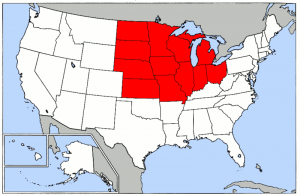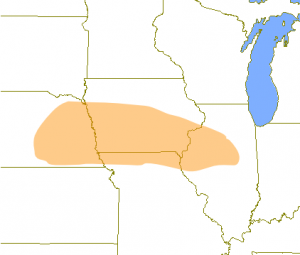| Topic: US accents | |
|---|---|
|
When talking about accents, if someone mentioned the "regular US accent" to you, what kind of accent would you think that is?
|
|
|
|
|
|
Inland Northern American English. I dunno Chicago is my favorite.
|
|
|
|
|
|
Normal is 'Network Anchor' normal..even
Canadian Broadcasters sound American. On a side note, krupa and I were talking to Johnn the other day, he sounds totally Canadian, VERY thick accent, eh? The funny part is, he thought krupa, with his Texas twang, and I, sounded identical! I think their ears also have accents. Or something. |
|
|
|
|
|
Normal is 'Network Anchor' normal..even Canadian Broadcasters sound American. On a side note, krupa and I were talking to Johnn the other day, he sounds totally Canadian, VERY thick accent, eh? The funny part is, he thought krupa, with his Texas twang, and I, sounded identical! I think their ears also have accents. Or something. I never really thought about it much. To me, most people where I live have no accent unless they're from another part of the US. Though, even a "midwestern" accent sounds a bit different to me and I wouldn't have considered it the standard American accent, but I guess it is? Per wiki: "The General American accent is most closely related to a generalized Midwestern accent and is spoken particularly by many newscasters. Walter Cronkite is a good example of a broadcaster using this accent.[citation needed] This has led the accent to sometimes be referred to as a "newscaster accent" or "television English". " |
|
|
|
|
|
Makes sense.
I hear no differentiation from what I say, to the midwesterners :-) |
|
|
|
|
|
Not even the northern mid-westerners? I know that's not the accent they're talking about, but for example, those in Minnesota definitely have stronger accents.
|
|
|
|
|
|
Do you have a Baltimore dialect? You pronounce hun hon.
|
|
|
|
|
|
Do you have a Baltimore dialect? You pronounce hun hon. No, I don't. |
|
|
|
|
|
Not even the northern mid-westerners? I know that's not the accent they're talking about, but for example, those in Minnesota definitely have stronger accents. Ooo no, those midwesterners sound like the cast of 'Fargo' to me. |
|
|
|
|
|
When talking about accents, if someone mentioned the "regular US accent" to you, what kind of accent would you think that is? IDK, I've been told I have an accent, but I never realized I had one. There's so much variety in the U.S. there's no such thing as "regular U.S. accent", that's like saying "American culture", America doesn't have it's own culture, it's a melting pot of every other culture. Just like there's no official language, though English is our primary language, it's not the official language of the U.S. |
|
|
|
|
|
When talking about accents, if someone mentioned the "regular US accent" to you, what kind of accent would you think that is? IDK, I've been told I have an accent, but I never realized I had one. There's so much variety in the U.S. there's no such thing as "regular U.S. accent", that's like saying "American culture", America doesn't have it's own culture, it's a melting pot of every other culture. Just like there's no official language, though English is our primary language, it's not the official language of the U.S. Apparently, there is a General American accent, which I guess would be the "regular US accent." http://en.wikipedia.org/wiki/General_American |
|
|
|
|
|
Anything but a Texish accent sounds weird.
|
|
|
|
|
|
I didn't realize it was such a small area that is considered the core of "General American English."
http://dialectblog.com/2011/08/01/general-american-english/ Just What is General American English? Posted on August 1, 2011 by Ben Trawick-Smith 
The American Midwest I’ve spent the last week on vacation with my girlfriend’s extended family. Most of them are from various parts of Pennsylvania, a state noted for its relative diversity of accents. Indeed, this was my experience throughout the week: I heard accents ranging from slightly Canadian-sounding (Northern/Central PA) to slightly Southern sounding (South/Western PA.) And yet, as I suggested with my recent post about the Philadelphia accent, Pennsylvania is not much renowned for its accents. I believe this is because most accents in the Keystone state are only a few degrees removed from General American English (aka GenAm), the term used to describe American accents that aren’t overly Northern, Southern or Eastern. As such, PA accents haven’t gained the notoriety of more pronouncedly regional varieties of English. But what accents, then, can be thought of as variants of GenAm? And at what point does an accent become “regional?” Here’s the Wikipedia blurb about General American English, which sums up the commonly understood definition succinctly: General American (GA), also known as Standard American English (SAE), is a major accent of American English. The accent is not restricted to the United States. Within American English, General American and accents approximating it are contrasted with Southern American English, several Northeastern accents, and other distinct regional accents and social group accents like African American Vernacular English. So General American English is exclusive by definition. Nevertheless, it is often described as “typical,” “neutral,” or some other slightly biased adjective. After reading numerous definitions of GenAm, however, I’d say the term describes a spectrum of accents rather than a single monolithic standard. In the narrowest sense, the General American “heartland” is found in a tiny chunk of the midwest. This map, created by an astute Wikimedia Commons contributor (extrapolated from the work of renowned linguist William Labov), indicates where “classic GenAm” can be found. In this area, the accent is alleged to most closely resemble the standard phonetic description of General American: 
Map of General American English Indeed, famed investor Warren Buffet, who has spent nearly all his life in Omaha, exhibits about as middle-of-the-road a General American accent as you can find in this interview: http://youtu.be/Lc791is6X0o Broadly speaking, however, the spectrum of GenAm probably includes areas with more marked accents such as the American Midland (Southern Ohio, Missouri, Kansas, etc.); and the Inland North (Michigan, Wisconsin, etc.) To my ears, these accents don’t sound particularly “standard” or “neutral” (adjectives I don’t feel describe any accent), but I’d say they at least lie at extreme ends of the General American continuum. But this definition covers a lot of ground. I therefore identify GenAm not by the presence or absence of regional features, but by the sheer number of these features present. Almost anyone, except those born in the stretch of the Midwest mentioned above, would be expected to exhibit some kind of regionalism (however slight). It’s the volume of these features that marks the difference, for me, between GenAm and “non-GenAm.” For example, I’ve heard people from the Southern half of Pennsylvania who mostly speak General American English, but with the marked regionalism of fronting the “long o” in words like “goat” or “go” (i.e. IPA ɜʊ or “eh-oh”). I’d still consider their speech “General American,” however, because I allow for an amount of “acceptable” variation within the GenAm category. And yet there is clear bias in how we perceive some accents as General American and others as “regional.” Certain features (for example, glide deletion in American Southern accents) are alone enough to exclude an accent from the GenAm clubhouse, while dozens of marked Northern accent features are accepted as minor deviations. As you may gather, General American is a concept for which I’ve struggled to find a satisfying definition. British Received Pronunciation has “Near RP,” a type of accent which is fairly close to RP but with some regionalisms or other “idiosyncracies.” Is it maybe time for there to be a “Near GenAm?” |
|
|
|
|
|
One of my very best friends is someone I met here on Mingle (see, Mingle does work) and she is from North Carolina. I love listening to her talk because of her accent. It's so cute but it takes her forever to complete a sentence because she talks so slow.

Johnn also has an awesome accent but it's not all Canadian. There's other stuff in there, too. Very sexy. 
I have spoken to a couple of Massachusetts people and only one had a bit of a Boston type accent. It was faint. Everyone else talked normal. You know...normal, like me. 
|
|
|
|
|
|
When talking about accents, if someone mentioned the "regular US accent" to you, what kind of accent would you think that is? midwestern |
|
|
|
|
|
I personally like hearing people speak in different accents.
I'm tired of hearing the so-called normal accent. |
|
|
|
|
|
I still wish I had a Texas accent

|
|
|
|
|
|
I wouldn't know....all Y'all sound funny to me.
But then I still have a thick southern accent!! |
|
|
|
|
|
I personally like hearing people speak in different accents. I'm tired of hearing the so-called normal accent. I'll speak in any accent you would like. I might drool a little though. |
|
|
|
|
|
I personally like hearing people speak in different accents. I'm tired of hearing the so-called normal accent. I'll speak in any accent you would like. I might drool a little though. Drooling is a turn-on for some women. 
|
|
|
|
|















